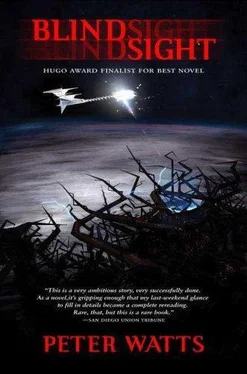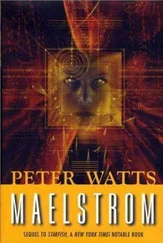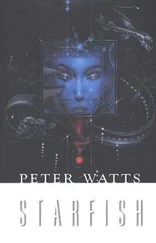Sentience isn’t even necessary to develop a “theory of mind”. That might seem completely counterintuitive: how could you learn to recognise that other individuals are autonomous agents, with their own interests and agendas, if you weren’t even aware of your own? But there’s no contradiction, and no call for consciousness. It is entirely possible to track the intentions of others without being the slightest bit self-reflective. [107] Zimmer, C. 2003. How the mind reads other minds. Science 300:1079-1080.
Norretranders declared outright that “Consciousness is a fraud”. [115] Nrretranders, T. 1999. The User Illusion: Cutting Consciousness Down to Size. Penguin Press Science. 467 pp.
Art might be a bit of an exception. Aesthetics seem to require some level of self-awareness — in fact, the evolution of aethestics might even be what got the whole sentience ball rolling in the first place. When music is so beautiful if makes you shiver, that’s the reward circuitry in your limbic system kicking in: the same circuitry that rewards you for fucking an attractive partner or gorging on sucrose. [116] Altenmüller, E.O. 2004. Music in your head. Scientific American. 14: 24-31.
It’s a hack, in other words; your brain has learned how to get the reward without actually earning it through increased fitness. [98] Pinker, S. 1997. How the mind works. WW Norton Co., NY. 660 pp.
It feels good, and it fulfills us, and it makes life worth living. But it also turns us inward and distracts us. Those rats back in the sixties, the ones that learned to stimulate their own pleasure centers by pressing a lever: remember them? They pressed those levers with such addictive zeal that they forgot to eat. They starved to death. I’ve no doubt they died happy, but they died . Without issue. Their fitness went to Zero.
Aesthetics. Sentience. Extinction.
And that brings us to the final question, lurking way down in the anoxic zone: the question of what consciousness costs . Compared to nonconscious processing, self-awareness is slow and expensive. [112] Matsumoto, K., and K. Tanaka. 2004. Conflict and Cognitive Control. Science 303: 969-970.
(The premise of a separate, faster entity lurking at the base of our brains to take over in emergencies is based on studies by, among others, Joe LeDoux of New York University [117] Helmuth, L. 2003. Fear and Trembling in the Amygdala. SCience 300: 568-569.
, [118] Dolan, R.J. 2002. Emotion, cognition, and behavior. Science 298: 1191-1194.
). By way of comparison, consider the complex, lightning-fast calculations of savantes; those abilities are noncognitive, [119] Treffert, D.A., and G.L. Wallace. 2004. Islands of genius. Scientific American 14: 14-23.
and there is evidence that they owe their superfunctionality not to any overarching integration of mental processes but due to relative neurological fragmentation . [4] Anonymous., 2004. Autism: making the connection. The Economist , 372(8387): 66.
Even if sentient and nonsentient processes were equally efficient, the conscious awareness of visceral stimuli — by its very nature — distracts the individual from other threats and opportunities in its environment. (I was quite proud of myself for that insight. You’ll understand how peeved I was to discover that Wegner had already made a similar point back in 1994. [120] Wegner, D.M. 1994. Ironic processes of mental control. Psychol. Rev. 101: 34-52.
) The cost of high intelligence has even been demonstrated by experiments in which smart fruit flies lose out to dumb ones when competing for food, [121] Proceedings of the Royal Society of London B (DOI 10.1098/rspb.2003.2548)
possibly because the metabolic demands of learning and memory leave less energy for foraging. No, I haven’t forgotten that I’ve just spent a whole book arguing that intelligence and sentience are different things. But this is still a relevant experiment, because one thing both attributes do have in common is that they are metabolically expensive . (The difference is, in at least some cases intelligence is worth the price. What’s the survival value of obsessing on a sunset?)
While a number of people have pointed out the various costs and drawbacks of sentience, few if any have taken the next step and wondered out loud if the whole damn thing isn’t more trouble than it’s worth. Of course it is, people assume; otherwise natural selection would have weeded it out long ago. And they’re probably right. I hope they are. Blindsight is a thought experiment, a game of Just suppose and What if . Nothing more.
On the other hand, the dodos and the Steller sea cows could have used exactly the same argument to prove their own superiority, a thousand years ago: if we’re so unfit, why haven’t we gone extinct? Why? Because natural selection takes time, and luck plays a role. The biggest boys on the block at any given time aren’t necessarily the fittest, or the most efficient, and the game isn’t over. The game is never over; there’s no finish line this side of heat death. And so, neither can there be any winners. There are only those who haven’t yet lost.
Cunningham’s stats about self-recognition in primates: those too are real. Chimpanzees have a higher brain-to-body ratio than orangutans, [122] Aiello, L., and C. Dean. 1990. An introduction to human evolutionary anatomy. Academic Press, London.
yet orangs consistently recognise themselves in mirrors while chimps do so only half the time. [123] Gallup, G.G. (Jr.). 1997. On the rise and fall of self-conception in primates. In The Self Across Psychology — self-recognition, self-awareness, and the Self Concept. Annals of the NY Acad. Sci. 818:4-17.
Similarly, those nonhuman species with the most sophisticated language skills are a variety of birds and monkeys — not the presumably “more sentient” great apes who are our closest relatives. [81] Hauser, M.D., N. Chomsky, and W.T. Fitch. 2002. The faculty of language: what is it, who has it, and how did it evolve? Science 298: 1569-1579.
, [124] Carstairs-McCarthy, A. 2004. Many perspectives, no concensus — a review of Language Evolution , by Christiansen Kirby (Eds). Science 303:1299-1300.
If you squint, facts like these suggest that sentience might almost be a phase, something that orangutans haven’t yet grown out of but which their more-advanced chimpanzee cousins are beginning to. (Gorillas don’t self-recognise in mirrors. Perhaps they’ve already grown out of sentience, or perhaps they never grew into it.)
Of course, Humans don’t fit this pattern. If it even is a pattern. We’re outliers: that’s one of the points I’m making.
I bet vampires would fit it, though. That’s the other one.
Finally, some very timely experimental support for this unpleasant premise came out just as Blindsight was being copy edited: it turns out that the unconscious mind is better at making complex decisions than is the conscious mind. [125] Dijksterhuis, A., et al. 2006. Science 311:1005-1007.
The conscious mind just can’t handle as many variables, apparently. Quoth one of the researchers: “At some point in our evolution, we started to make decisions consciously, and we’re not very good at it.” [126] Vince, G 2006. “’Sleeping on it’ best for complex decisions.” Newscientist.com, http://www.newscientist.com/channel/being-human/dn8732.html .
Miscellaneous Ambience (Background Details, Bad Wiring, and the Human Condition)
The child Siri Keeton was not unique: we’ve been treating certain severe epilepsies by radical hemispherectomy for over fifty years now. [127] Devlin, A.M., et al. 2003. Clinical outcomes of hemispherectomy for epilepsy in childhood and adolescence Brain 126: 556-566.
Surprisingly, the removal of half a brain doesn’t seem to impact IQ or motor skills all that much (although most of hemispherectomy patients, unlike Keeton, have low IQs to begin with). [128] Pulsifer, M,B., et al. 2004. The cognitive outcome of hemispherectomy in 71 children. Epilepsia . 45: 243-54.
I’m still not entirely sure why they remove the hemisphere; why not just split the corpus callosum, if all you’re trying to do is prevent a feedback loop between halves? Do they scoop out one half to prevent alien hand syndrome — and if so, doesn’t that imply that they’re knowingly destroying a sentient personality?
Читать дальше









